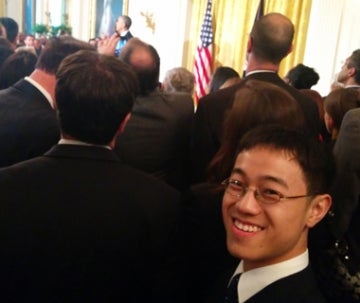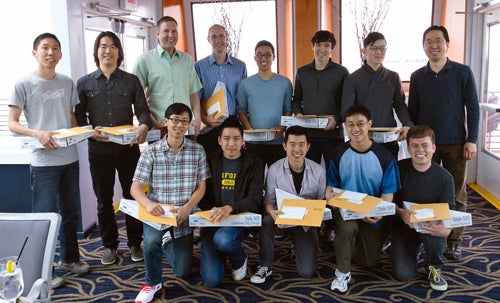
How did a Waterloo undergrad get recruited to help Obama?
Software engineering student got an invite to the White House after helping resuscitate HealthCare.gov

Software engineering student got an invite to the White House after helping resuscitate HealthCare.gov
By Christian Aagaard Marketing and Strategic CommunicationsWhen David Hu finished his exams, like most university students, he was looking forward to a break.
Unlike most new grads, however, Hu then did something a little different. He:

“It was a little surreal,” says Hu, a graduate of Waterloo’s software engineering program. “It was a very cool experience to meet Obama and be inside the White House.”
How does a Canadian university student get an invite to the White House?
While the long story starts with Waterloo’s co-operative education program, the short story is that Hu was one of two Waterloo software engineers who were among dozens of tech experts called in last fall to the bedside of HealthCare.gov, an online resource set up by the U.S. government under the so-called Obamacare program.
It was designed to match millions of Americans with health-care options offered by insurers. But soon after it went live, HealthCare.gov failed, unable to process the demand.
The White House reception in the spring was held to thank all of the tech experts like Hu and Ben Komalo, another Waterloo software engineering grad, who successfully got the website back on track.
“This was not only a chance to do something I support — bringing health care to the masses; but it might be a way to change how government writes software,” says Hu, "We were working as a startup within a giant enterprise. If what we were building was successful, maybe this could be seen as a prototype of how government could do work in the future.’’
When the system broke, the fix-it plan reached out to Google, and Googlers reached out to former colleagues. Komalo worked for Google for more than four years after graduating from Waterloo as a software engineer in 2007.
Today, Komalo and Hu work for Khan Academy, a California-based developer of online educational tools.
They were asked to join the HealthCare.gov recovery project by a mutual friend, Brandon Ballinger. Ballinger is a former Googler, and co-founder of Sift Science. Hu had done an internship at Sift.
Komalo arranged a leave of absence with Khan Academy. By early December, he was unpacking at a hotel in Columbia, Maryland, outside Washington, D.C. The initial pitch was for a commitment of about month and half.
“I said, ‘Sure, that sounds fun. And important. I’ll give it a shot,’ ” Komalo says. “I left, and it ended up being three months-plus.’’
Meanwhile, Hu was in Waterloo, aiming for graduation.
When the opportunity to work on HealthCare.gov surfaced, he dropped a course, skipped more than a few lectures and spent part of his days telecommuting to Maryland to help HealthCare.gov. Occasionally, he would fly down to join the team.
“I feel I did a very small part of a very important project,” Hu says. "There were a lot of people on this project. Ben Komalo deserves way more recognition than I do.”
Komalo and Hu sketch similar pictures of what life was like on the project: Long hours working at tables cluttered with laptops and cans of diet soda; long strings of code to tear down and rebuild into a leaner, more efficient system.

Tech experts who worked on HealthCare.gov. Waterloo alumni Ben Komalo, front row centre and David Hu, front row, second from right.
And roiling just overhead, stormy political weather. Obamacare faced strong opposition. Problems with HealthCare.gov fed the scorn.
“It was pretty intense,’’ Komalo says of effort to get the website back on its digital feet. “It was time-boxed, and we were all there to make an impact for year one. Time was ticking, and we really wanted to get stuff done as early as possible to help as many people as possible.”
Recruited from fleet-of-foot startups and tech companies that think tomorrow is too late, the people brought in to save HealthCare.gov found themselves in unfamiliar territory. Information technology in big government has deeper decision-making layers.
Yet, Komalo says, its function is tremendously important.
“These are big complex systems, but they affect millions and millions of lives,” he said. “People need these services . . . Being there reminded me of some of the problems that can be solved with tech, and some of things that people could be working on that are pretty high-impact.”
Hu says he called on entrepreneurial lessons learned on and off campus: team work, iterating then re-iterating, and ranking tasks according to priority.
“By far the most valuable thing I got at Waterloo in terms of education were the co-op terms, Hu says. "If I had not done the co-op terms, I definitely would not have had the skills or the experience to contribute meaningfully to something like this.”

Read more
Here are the people and events behind some of this year’s most compelling Waterloo stories

Read more
Waterloo Engineering community honours impact and innovation at annual awards dinner

Read more
Meet five exceptional Waterloo graduate students crossing the convocation stage as Class of 2025 valedictorians
The University of Waterloo acknowledges that much of our work takes place on the traditional territory of the Neutral, Anishinaabeg, and Haudenosaunee peoples. Our main campus is situated on the Haldimand Tract, the land granted to the Six Nations that includes six miles on each side of the Grand River. Our active work toward reconciliation takes place across our campuses through research, learning, teaching, and community building, and is co-ordinated within the Office of Indigenous Relations.